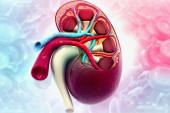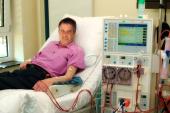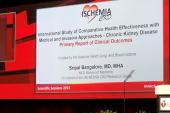Routine Coronary Tests Prior to Kidney Transplant Questioned
New retrospective data highlight not only the range of pretransplant tests used but also the lack of a link to outcomes.

Among patients slated for kidney transplant, preprocedural testing to screen for coronary heart disease (CHD) does not seem to reduce the rates of death and MI within 30 days after surgery, according to a new analysis of retrospective data. It may even cause harm.
Without a large, randomized trial confirming the lack of utility for these tests, standard practice of pretransplant testing for CHD is unlikely to change at most transplant centers, but the findings beg the question of whether a new paradigm is needed, lead author Xingxing S. Cheng, MD (Stanford University School of Medicine, Palo Alto, CA), told TCTMD.
Because transplantation is “one of the most heavily scrutinized areas in medicine,” coupled with an ongoing organ shortage, transplant programs tend to be conservative about making practice changes without robust evidence, she explained. “There is the feeling that we have got to make sure our patients do not have significant heart disease [such] that they'll die of heart problems within a few years,” Cheng said. “That would be a waste of an organ that would have gone to someone who would have lived longer.”
However, she recalled questioning the necessity of these tests throughout her training. “These are patients who otherwise would never have any of these tests, because they are asymptomatic,” Cheng said. “I just remember thinking about all the things they go through for kidney transplant. . . . Are all of these things really necessary?”
Sripal Bangalore, MD (NYU Langone Health, New York, NY), served as the co-primary investigator of the ISCHEMIA-CKD study, which also did not show any advantage of an invasive strategy for patients on the transplant list. He told TCTMD that one of the biggest “hurdles” his team faced with enrollment of that study was dealing with strict pretransplant testing regimens across the country.
“It is very difficult to change practice unless we have large, randomized trials which clearly show that there is no benefit, and then we need to have mechanisms in place,” Bangalore said. “When we were doing ISCHEMIA-CKD, some of the transplant surgeons would tell us that if one patient dies because they were randomized to a conservative strategy, their program would be shut down.”
While he was not surprised by the results of this study, Bangalore said it was interesting to note the “variability” in types of testing that were used.
Pretransplant Testing
For the study, which was published online this week in JAMA Internal Medicine, Cheng and colleagues included 79,334 first-time kidney transplant recipients (mean age 56 years; 38% women) from the US Renal Data System with at least 1 year of Medicare data before and after transplant between 2000 and 2014.
The primary outcome of death or acute MI within 30 days of transplant was recorded in 5.3% of patients. The 30-day event rate decreased over time, from 6.6% in 2000-2003 to 4.4% in 2012-2014.
From 2012 to 2014, CHD testing rates ranged from 24% to 56%, with similar patterns observed in earlier study periods. In an instrumental-variable analysis, CHD testing did not change the rate of the primary outcome, with a rate difference of 1.9% compared with no testing. This finding was similar for all but the earliest time period, from 2000 to 2003, when CHD testing was associated with a higher event rate and a rate difference of 6.8%.
While the researchers could not take a granular look at the differences in testing types, Cheng said that this study included “noninvasive testing like stress echocardiogram or a myocardial perfusion scan, but also a decent subset got an actual invasive coronary angiogram.”
What surprised her the most about their findings was that even after accounting for any confounding, they still found a potential hint of harm associated with pretransplant CHD testing in the earliest cohort of patients, Cheng said. “The fact that there is still a signal for harm I think does point to the problem that maybe testing is not really benign. Overtesting can lead to its own problems.”
She specifically attributes the potential for harm seen in the earliest cohort to an increase in placement of bare-metal stents following CHD testing and the complications associated with dual antiplatelet therapy following that.
Changes in Practice?
Next, Cheng said she would like to see a randomized trial compare standard screening with “de-escalated” screening and compare posttransplant outcomes. Over the past decade, several groups have tried to perform such a study, but none have come to fruition, likely because of hesitation by transplant programs, she said.
The ongoing CARSK trial, which is looking at the effect of follow-up CHD testing after waitlist entry for kidney transplant, should provide more helpful information in this space.
“[CARSK] may not still answer this question of whether testing is beneficial,” Bangalore said. “But at least it is a step in the right direction to see that one more randomized trial is trying to address this.”
While this trial is unlikely to alter clinical practice, he said results of ISCHEMIA-CKD has already led to some changes at his institution. Namely, patients with CHD in a branch or distal vessel are now being medically managed, Bangalore said. “It is a different story if it is a proximal vessel disease. But if it is branch vessel, distal vessel, I think there is now increasing recognition that revascularization may not help those patients and there seems to be a somewhat good level of comfort among everybody taking care of these patients to medically manage them.”
Yael L. Maxwell is Senior Medical Journalist for TCTMD and Section Editor of TCTMD's Fellows Forum. She served as the inaugural…
Read Full BioSources
Cheng XS, Liu S, Han J, et al. Association of pretransplant coronary heart disease testing with early kidney transplant outcomes. JAMA Intern Med. 2023;Epub ahead of print.
Disclosures
- Cheng reported receiving grants from the American Heart Association during the conduct of the study.
- Bangalore reports no relevant conflicts of interest.





Comments